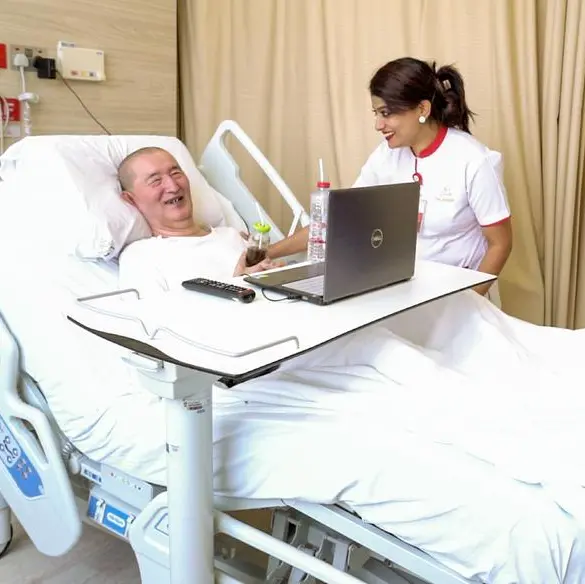PHOTO
Doha, Qatar: Qatar Genome Programme (QGP) of Qatar Foundation (QF) is leading several studies that show the importance of pharmacogenomics in precision medicine, as well as the role of identifying genetic characteristics associated with individual responses to drugs in enabling better healthcare.
“Pharmacogenomics aims to identify treatment regimens based on the genetic makeup of the individual, and this approach is being further strengthened through international organisations that define protocols for this,” said Dr. Wadha Al Muftah, Director of Applied Genomics at QGP.
“The treatment concerns specific drugs and takes advantage of genetic data to improve drug selection and dosing. As a result, patients may have better clinical outcome,” she added. Pharmacogenomics looks at how genes affect the way the body responds to drugs. Essentially, it helps doctors understand why different people react differently to the same medicine.
QGP is a national population-based research project to study the genetic makeup of the Qatari population and other Arab populations, create large-scale genomic databases, and provide research opportunities to introduce precision medicine and personalised healthcare.
In cooperation with HMC, additional steps are being taken to design treatment plans for patients who need surgical intervention, by identifying their genetic characteristics.
“This approach allows for the personalisation of treatments, doses, and post-operative care, which improves patient outcomes,” said Dr. Al Muftah, who has been working at QGP since 2016 and manages applied programmes in healthcare.
According to Dr. Al Muftah, the programme has made significant progress in helping to reduce the length of hospital stays from seven days to just three days for some patients, which reflects the effectiveness of this approach.
“It is encouraging that patients have shown positive responses to drug treatments tailored to their genetic traits, which confirms the potential of genomic medicine to revolutionise patient care,” she added. In terms of the practical application of pharmacogenomics, QGP is collaborating with HMC’s Heart Hospital on projects focusing on specific types of medicines.
“Patients who come to the cardiac emergency room undergo rapid genetic testing to identify genetic factors that influence response to medications,” said Dr. Al Muftah.
“Subsequent treatment decisions, including adjustments in doses, are expedited based on the results of a DNA test, leading to improved treatment outcomes and reducing hospitalisation periods.”
Through careful analysis of genomic data, the genome programme has enabled the early identification of people at risk of developing breast cancer, in addition to enabling early detection and the taking of preventive measures. Those identified are immediately referred to the National Center for Cancer Care and Research, affiliated with HMC.
Dr. Al Muftah said the programme is looking to build on this by applying the same methodology to detect those at risk of developing colon cancer, based on specific genetic markers.
In parallel with advances in pharmacogenomics, efforts in the field of early childhood healthcare are focusing on preventive measures that allow detection of, and intervention around, genetic diseases. Collaborative projects between HMC and QF’s Sidra Medicine reflect the proactive nature of this approach that aims to identify and treat genetic diseases in newborns in the early stages of their lives.
Additionally, analysing the genomic data of Qatar’s population helps determine genetic predisposition to diseases — such as cancer and heart disease — which supports strategic planning for disease prevention and management.
Ensuring ethical practices in maintaining patient or genomic data presents numerous challenges. However, QGP is aiming to advance international and local ethical standards to ensure patient privacy is protected.
“One of the fundamental ethical matters is a patient’s consent to share data, which we strictly observe,” said Dr. Al Muftah.
“Through close cooperation with physicians, we design treatment plans based on genetic predisposition, and early detection allows the development of personalised prevention strategies, in collaboration with healthcare providers, to mitigate the onset of the disease.”
Delivering Wellness and lifestyle genomic reports is a framework within QGP. Genetic profiling now extends beyond treatment and disease detection to include lifestyle factors. Understanding the genetic basis of lifestyle-related diseases enables the development of proactive prevention strategies – reducing the risk, or delaying the onset, of genetic conditions.
“Early detection of lifestyle-related diseases significantly reduces the probability of their occurrence, which confirms the great preventive potential that genetic characteristics can provide across the spectrum of healthcare,” said Dr. Al Muftah.
© Dar Al Sharq Press, Printing and Distribution. All Rights Reserved. Provided by SyndiGate Media Inc. (Syndigate.info).





















